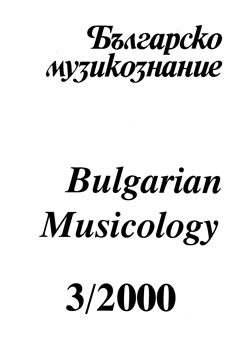Продуциране на послания в съвременната „етническа“ музика
Contemporary "Ethnic" Music: Producing Meanings
Author(s): Claire LevySubject(s): Music
Published by: Институт за изследване на изкуствата, Българска академия на науките
Summary/Abstract: The aim of the study is two-folded. For one, it is an attempt to oppose - in the light of the cultural relativism and pluralism - to some recent racist and high-brow attitudes among “high” circle, who are eager to govern the Bulgarian culture and fuel a public moral panic in connection with the rising in the 1990s. popular music phenomenon (called chalga, ethnopop or folkpop) which have revived, integrated and updated a variety of different ethnic Balkan music traditions. For two, the study is trying to explain the very producing-meanings process that supposed to enlighten questions of why and in what sense the new “ethnic” music is significant for Bulgarians. The analysis interprets the new “ethnic” music culturally and historically, employing empiric material, collected during the “field work” on the specific “media terrain”, and doing at the same time cultural parallels in time and place beyond Bulgarian culture. Methodo logically, It is based on the “dialogical” approach to music history (Negus 1996), the theory of continuity and change (Netti 1996), and the communication theory suggesting that communication process is not a mere transmission of information but a process which constitutes and creates specific cultural meanings (Craig 1999). Discussing the specific dynamics of the “own-foreign” dichotomy as observed historically in Bulgarian popular music, and introducing another dichotomy seeing the “ethnic” as bringing rather “today’s yesterday” than “today’s tomorrow”, the study outlines projections of two main aesthetic concepts dominating the present manifestations of the “ethnic” music in Bulgaria: of quasi-realism and of rablezian parody. Through analyzing some emblematic artifacts in the field, the discussion is trying to follow and present the logic of the process, reconstructing old meanings into new ones, and to make bearable as well the human call for understanding cultural differences, hidden in the very dialogical nature of music.
Journal: Българско музикознание
- Issue Year: 2000
- Issue No: 3
- Page Range: 69-89
- Page Count: 21
- Content File-PDF

